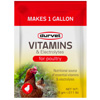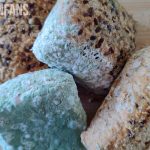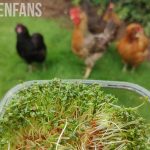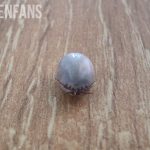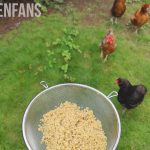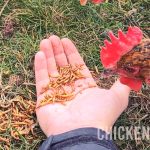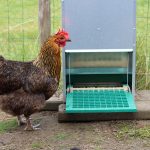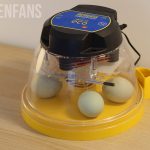Durvet Vitamins & Electrolytes for Chickens: Review & Ingredient Analysis
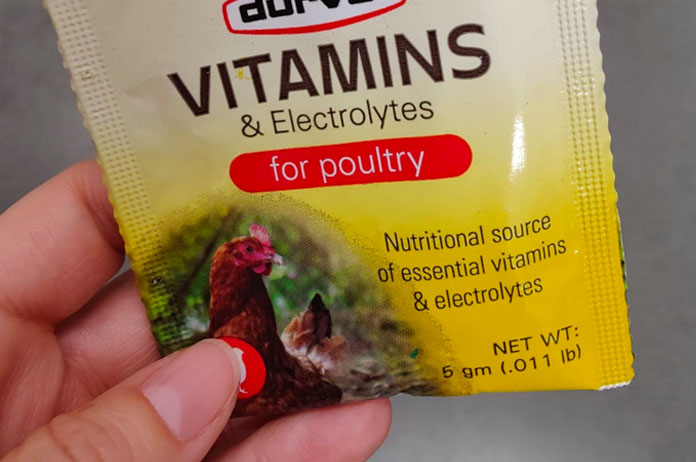
Durvet Vitamins & Electrolytes for Chickens is a supplement that contains vitamins and salts. The label is full of chemical compounds. We discuss the ingredients, how the supplement can help, and when to avoid it.
If you’re in a hurry, here are the key takeaways:
- Ideal during stress, heat, cold, molting, relocation
- Short term use for hatchlings, chicks & chickens that need support
- Full spectrum of vitamins A, B, C, D, E and K
- Avoid during treatment with Corid (amprolium) for coccidiosis
- Avoid when using amprolium-medicated feed
If you are looking for the supplement, here is the product that we are analyzing and reviewing:
- Mix 5g per gallon of drinking water.
- There is a 5g scoop enclosed in the package.
- Refresh the water daily.
Let’s start with the practical part before we take a deep dive into the nutrient list.
How to Give Durvet Vitamins & Electrolytes
Durvet ships the supplement in two forms: small dose packages for exactly 1 gallon and a 100-gram container. We found the packages really convenient, as you don’t have to fiddle with teaspoons. However, the container comes with an enclosed spoon, so that’s not too much of a hassle either.
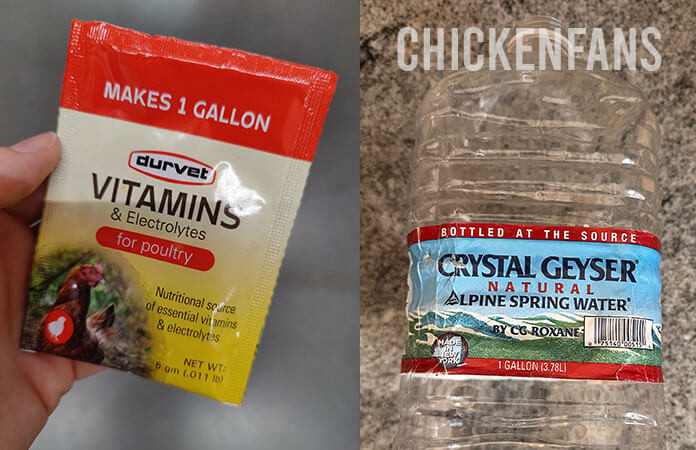
By adding the supplement first, the free-flowing tap water can mix the supplement when the jug fills. After filling the jug, the water gets cloudy with a yellowish shine.
Refresh the water daily. Our chickens drank much more than usual, seemingly trying to catch up with skipped sips. That’s probably not because they like the taste of the supplement but rather due to its extremely high salt levels, as we’ll discuss later.
Vitamins
The Durvet Vitamins & Electrolytes supplement contains vitamins A, B, C, D, E, and K. The vitamin B content comes as a B-complex with several B vitamins.
The following table gives an overview of vitamin content in 1 scoop of supplement, next to the optimal daily values of the specific vitamins for egg-laying hens in I.U. or mg/kg air-dry feed.
| Ingredient | Amount | Daily Value | Type |
|---|---|---|---|
| Vitamin A | 22,500 mg | 8,000 – 12,000 I.U. | Vitamin |
| Vitamin C | 34 mg | 100mg | Vitamin |
| Vitamin D3 | 9,000 I.U. | 3000 – 4000 I.U. | Vitamin |
| Vitamin E | 9 I.U. | 20 – 30 I.U. | Vitamin |
| Vitamin B12 | 20 mcg | 15-25 mcg | Vitamin |
| Riboflavin (Vitamin B2) | 7 mg | 5 – 7 mg | Vitamin |
| Niacin (Vitamin B3) | 22.5 mg | 30 – 50 mg | Vitamin |
| D-Pantothenic Acid (Vitamin B5) | 11 mg | – | Vitamin |
| Thiamine (Vitamin B1) | 2.25 mg | 2 – 2.5 mg | Vitamin |
| Pyridoxine (Vitamin B6) | 2.25 mg | 3.5 – 6 mg | Vitamin |
| Folic Acid (Vitamin B9) | 0.6 mg | 1 – 1.5 mg | Vitamin |
| Menadione (Vitamin K3) | 9 mg | 2.5 – 3 mg | Vitamin |
Whereas other supplements usually lack one or more vitamins, this supplement has them all.
- Vitamin A: Vitamin A is critical in maintaining vision in dimmed light and shady environments, essential for immunity and overall growth and development.
- Vitamin B Complex: Vitamin B supports healthy metabolism, energy production, and nervous system function
- Vitamin C: ascorbic acid is an essential water-soluble vitamin and antioxidant that’s key to a chicken’s health. Chickens can partially synthesize vitamin C in their livers, but they still require dietary sources for optimal health. It’s also important for tissue development and the immune system.
- Vitamin D: Vitamin D is important for the immune system, calcium absorption, and the formation of bones and eggshells. Chickens can also produce vitamin D in their skin by exposure to direct sunlight.
- Vitamin E: the supplement contains 9 I.U. of vitamin E per scoop. Vitamin E is an antioxidant and helps protect cells from oxidative damage, supporting overall health and immunity.
- Vitamin K: Vitamin K is key in blood clotting, bone health, and a chicken’s overall growth and development.
These doses are ideal for adult chickens as well as chicks. Although chicks are much lighter and smaller, they also drink less and require more as their body grows. Adult chickens only need vitamins for body maintenance and support and no longer for development. However, bear in mind that chicks are more prone to side effects of excessive doses, so always follow the instructions on the label.
It’s a good thing that all fat-soluble vitamins (A, D, E, and K) are present. These vitamins tend to ‘take up space’ in the body, and providing supplements that lack one of the vitamins can result in deficiencies.
One thing to mention is that the product also contains vitamin B12:
- Vitamin B12 is key for maintaining the nervous system and is important in many body functions. Chickens can not synthesize all vitamin B12 by themselves. We discuss the pros and cons of vitamin B12 in depth in another article.
Electrolytes
Like many supplements with Electrolytes on the label, the product only contains salt and potassium. No other electrolytes, like magnesium or calcium, are in the package.
The salt levels are high, as the supplement contains 86-91% salt and 32-39% sodium. The Rooster Booster Vitamins & Electrolytes, for example, has 24-26% salt (and also has Electrolytes on the label).
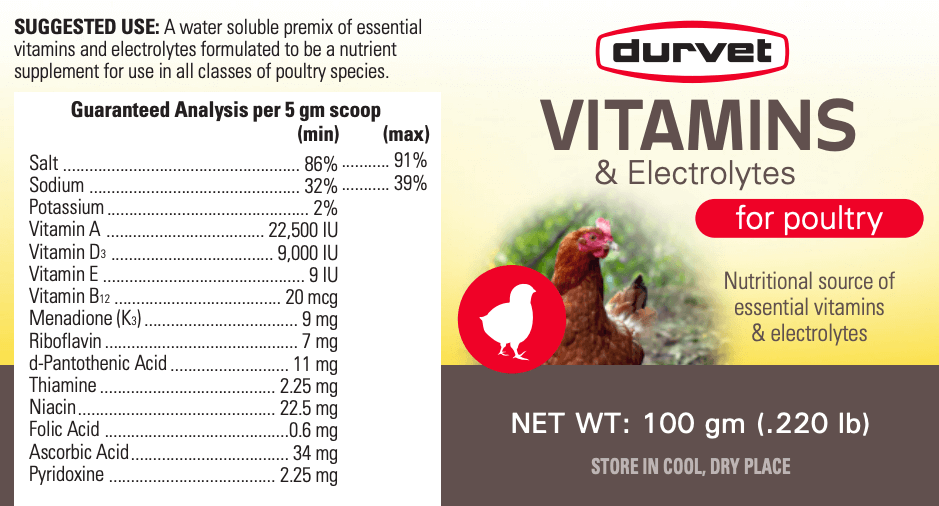
Salt and potassium are important for a number of reasons:
- Fluid balance: electrolytes help the chicken’s body to balance its internal water levels and acid balance
- Muscles & Nerves: they are vital for muscle contraction and transmission of nerve impulses
- Metabolism: they play a key role in several metabolic body processes
- Immune System: they regulate the pH balance of the blood and bodily fluids, which is important for the immune system to function properly
Extra supplementation can help chickens:
- in case of diarrhea, which can lead to dehydration and electrolyte imbalances
- in stressful situations like relocation or bad confinement conditions
- when dealing with heat stress or hot temperatures
- when suffering from diseases that affect nutrient absorption
- when they only get plants, grains and vegetables, generally low in sodium
- during high levels of activity and excitement
Excessive salt and potassium can also be harmful. Too much salt can cause dehydration, electrolyte imbalances, and several other health problems.
When To Avoid Durvet Vitamins & Electrolytes
Avoid feeding Durvet Vitamins & Electrolytes supplement to a brood of chicks on medicated chick feed or chickens being treated for coccidiosis with Corid (amprolium).
Amprolium is a chemical compound that imitates vitamin B1 (thiamin) and prevents the coccidiosis parasites from synthesizing sugars, so they can’t replicate, starve and die. Since amprolium is so similar to vitamin B1, it inhibits the active transport of real thiamin into the cells.
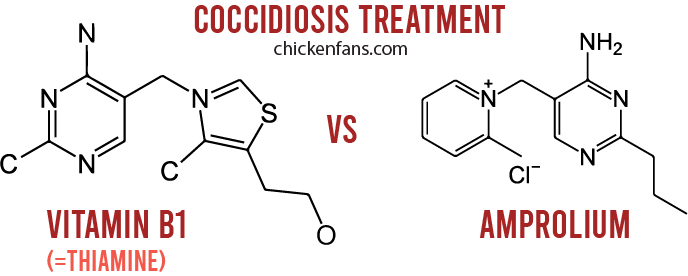
As this Durvet supplement contains high levels of vitamin B1, it would cancel the thiamin-blocking effect of amprolium and make the medication ineffective. It also prevents chicks on an amprolium-medicated feed from building immunity to coccidiosis.
Further Reads
- Rooster Booster Vitamins & Electrolytes: a comparable vitamin supplement that does not contain vitamin C, K, and B12, which this one does, but on the other hand contains Lactobacillus (live microorganisms)
- Rooster Booster Poultry Cell: a vitamin, mineral, and amino acid supplement for chickens and backyard poultry sold by Rooster Booster
- Vitamin B12 for Chickens: an essential vitamin that chickens can’t get from plant-based food
- Probiotics for Chickens: probiotics are natural supplements with live microorganisms found in the chicken’s digestive system. They promote a healthy gut, boost the immune system, egg laying, and prevent viral and bacterial diseases.
- Calcium for Chickens: Calcium is essential for chickens as it’s vital for egg production, controls heart rate and blood clotting, promotes a healthy nervous system, supports growth and development, boosts bone strength, activates digestive enzymes, and regulates the body’s pH.
- Vitamin K for Chickens: vitamin K is a group of 3 chemicals essential for blood clotting, biosynthesis of proteins, bone composition, and embryo development in chickens and poultry.
Frequently Asked Questions
The supplement is safe when following the label and safety sheet instructions. Excessive use can cause problems due to high doses of certain vitamins. Never use the supplement when you are treating chickens for coccidiosis with a product containing amprolium, like Corid.
Yes, the eggs are safe to eat, and there is no egg withdrawal time for chickens that get Durvet Vitamins & Electrolytes.
Mix 5g Durvet Vitamins & Electrolytes per gallon of drinking water. Refresh the water daily. A 100g container contains enough product to mix 20 gallons. There is a 5g scoop enclosed in the package.
Durvet Vitamins & Electrolytes is a soluble premix of essential vitamins and electrolytes to support chickens and poultry during stress, heat, cold, molting, and relocation. It’s also great to support for hatchlings and young chickens.
